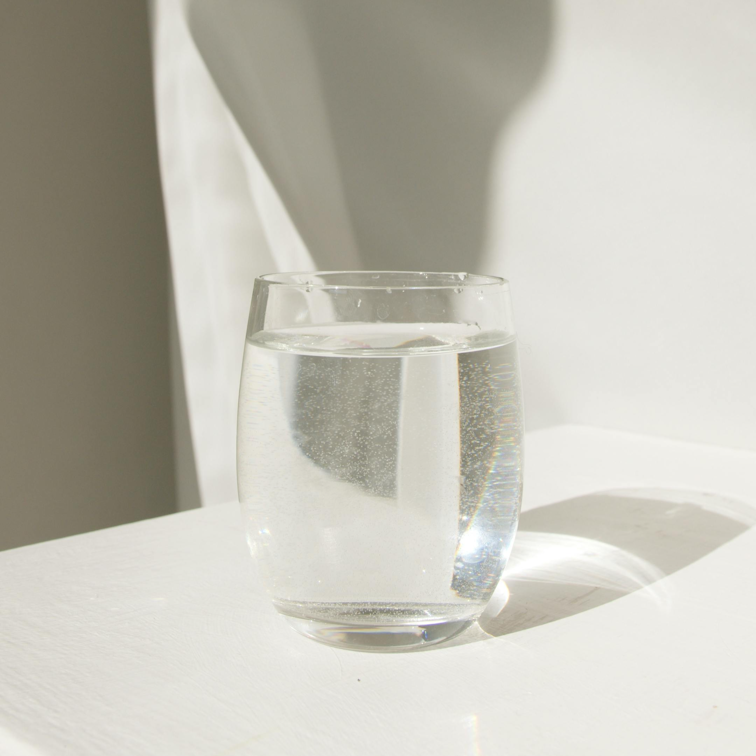
Is the salt water diet safe for your teen?
A GP-verified guide for parents

Quick summary
- Salt water flushing is a social media trend claiming to cause weight loss, but it's not a long-term solution
- This method is unsafe and can lead to dehydration, dizziness, and serious health risks, with no real benefits for weight loss
- Encourage your teen to focus on safe, sustainable habits like balanced nutrition and exercise rather than harmful quick fixes

We know from speaking with lots of parents that you’re keen to stay informed about the trends your teens might be exposed to on social media.
One such trend is salt for weight loss – more specifically, salt water fasting or salt water flushing.
In this article, we’ll help you understand whether the saltwater flushing trend benefits your teen or puts them in danger.
And keep reading to learn about what alternatives you can suggest to your teen.
What actually is a salt water diet?
The salt water diet involves drinking salt water, often on an empty stomach.
Proponents claim benefits like extreme weight loss, improved skin health, and an overall detox of the body.
But how does salt actually work for weight loss?
To understand this, let's get a bit scientific.
Salt is a combination of sodium and chloride, electrolytes that retain water and are naturally present in your blood.
If your teen drinks salt water, the sodium holds more water than needed in their colon (the longest part of the large intestine).
This excess water causes the bowel to move, essentially making them need to go to the toilet to have a bowel movement.
In essence, salt water flushing acts like a laxative, a type of medicine taken to relieve constipation.
While laxatives can clear out the bowel, there's no scientific evidence that they lead to long-term weight loss and they can be harmful if used frequently without medical supervision.
Salt water flush benefits: myths vs facts
Your teen may have seen a viral TikTok video showing an influencer losing some weight on the salt water diet.
But is there actually any benefit to salt water flushing?
To answer that question, we’ll first get you familiar with the myths:
- It helps to lose fat quickly: any weight loss is usually just water weight, not actual fat loss
- It detoxifies the body: your liver and kidneys already handle detoxification – salt water doesn't cleanse your organs
- It’s a safe and natural remedy: drinking large amounts of salt water can lead to dehydration and electrolyte imbalances
- It improves digestion long-term: there's no evidence that repeated flushes benefit gut health; in fact, overuse can disrupt normal digestion
You probably already guessed that salt water flushing has no actual benefits.
Rather, it may seriously complicate your teen's health.
So, the facts you should know, to pass on to your teen if appropriate:
- It causes rapid bowel movements: the high salt content draws water into the intestines, which leads to urgent trips to the bathroom
- It may temporarily relieve constipation: occasional use, when recommended by a doctor, might help with mild constipation, but it's not a recommended as a DIY method or as a sustainable solution
- It carries health risks: salt water flushes can cause nausea, bloating, and electrolyte imbalances, especially in teens
- It is not medically endorsed for teens: healthcare professionals advise against teens using it as a detox or weight-loss method due to a lack of evidence and potential harm
Potential risks of the salt water diet for teens
As a DIY method, salt water flushing is without a doubt unsafe unless recommended by a doctor.
It can create an imbalance in electrolytes due to excessive salt intake, leading to:
- Dehydration: salt water can flush out fluids too quickly, leading to dizziness, weakness, and serious health risks
- Stomach issues: teens may experience cramping, nausea, and diarrhea, stressing their digestive system
- Hindered development: extreme flushing can affect nutrient absorption, impacting growth, hormones, and brain development
It can also lead to disordered eating patterns – fad diets like this may encourage unhealthy habits and negative body image
Despite what some social media influencers might claim, their short-term successes are often highlighted without showing the long-term health impacts.
That’s why you must create a safe space to talk to your teen about healthy eating.
What can your teen do instead of salt water diet?
luna does not recommend losing weight unless someone is actually overweight – the child BMI calculator on the NHS can be used as a guide for this.
If weight loss is necessary, a long-term exercise plan combined with a balanced, healthy diet is the best approach – a doctor can also advise further on this.
For actionable strategies to encourage physical activity, check out this guide to helping teens develop an interest in exercise.
Try to encourage your teen to be sceptical of quick fixes and to understand that sustainable health practices are key.
Remind them as well that if something seems too good to be true, it probably is.
If your teen seems affected by unrealistic beauty standards, this guide on recognising low self-esteem in teenagers can help you provide support.
Hopefully now, if they have questions about such trends, you can provide them with the knowledge to make informed decisions.
How we created this article:
luna's team of experts comprises GPs, Dermatologists, Safeguarding Leads and Junior Doctors as well as Medical Students with specialised interests in paediatric care, mental health and gynaecology. All articles are created by experts, and reviewed by a member of luna's senior review team.
Sources:
Heart "How much sodium should I eat per day?" | Accessed 27.03.25
https://www.heart.org/en/healthy-living/healthy-eating/eat-smart/sodium/how-much-sodium-should-i-eat-per-dayC. E. Chambers, H. G. Carter, "Saline lavage: a rapid, safe, effective method of whole-gut irrigation for bowel preparation" | Accessed 27.03.25
https://pubmed.ncbi.nlm.nih.gov/684491/#NHS "Laxatives" | Accessed 27.03.25
https://www.nhs.uk/conditions/laxatives/Rebecca M Reynolds, Paul L Padfield, Jonathan R Seckl "Disorders of sodium balance" | Accessed 27.03.25
https://www.ncbi.nlm.nih.gov/pmc/articles/PMC1410848/Find out about trends when your teen does
Sign up to our parent newsletter for emails on the latest teen trends, insights into our luna community and to keep up to date
By signing up, you are agreeing that we can use your email address to market to you. You can unsubscribe from marketing emails at any time by using the link in our emails. For more information, please review our privacy statement.